National Advisory Board
The mission of the CSE National Advisory Board is to help the Division face current academic and societal issues with the goal of serving the needs of both the university and students in navigating an evolving industry and educational landscape. Comprised primarily of Michigan alumni, the Board provides guidance and help with key CSE priorities, including alumni and industry engagement, inclusion and diversity, entrepreneurship, education innovation, and future initiatives.
Chris Bedi (BSE CE, ’96)
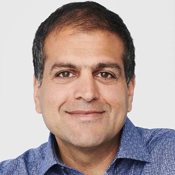
Chris Bedi is the Chief Digital Information Officer at ServiceNow. Bedi joined ServiceNow in September 2015 and serves as the chief information officer. Prior to joining ServiceNow, he spent nearly four years as CIO of JDSU, where he was responsible for IT, facilities, and indirect procurement. Chris held various positions at VeriSign between April 2002 and August 2011, including CIO, vice president of corporate development, and vice president of human resource operations. He began his career at KPMG Consulting and holds a bachelor’s degree in computer engineering from the University of Michigan.
Paul Daugherty (BSE CE ’86)
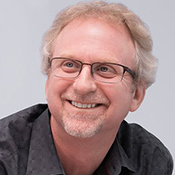
Paul Daugherty is Accenture’s Chief Technology and Innovation Officer (CTIO) and is a member of Accenture’s Global Management Committee. As a visionary in shaping the innovation of technology, Paul leads and executes Accenture’s technology strategy, leveraging the company’s leading-edge capabilities and research and development to reinvent the future of business.
As CTIO, Paul also leads Accenture’s Innovation strategy and organization, including Accenture Labs and The Dock in Dublin, Ireland. He directs Accenture’s global research and development into emerging technology areas such as generative AI, quantum computing, science tech and space technology. He leads a dedicated innovation group that not only designs and delivers transformational business and technology solutions, but also invests in, and partners with, pioneering companies to pilot and incubate new technologies. Paul also leads Accenture’s annual Technology Vision report, hosts its annual Innovation Forum event, and leads Accenture Ventures, which he founded to focus on strategic equity investments to accelerate growth.
Previously, Paul served as Accenture’s Group Chief Executive – Technology, where he led all aspects of Accenture’s Technology business.
Paul is co-author of two highly acclaimed books: Human + Machine: Reimagining Work in the Age of AI (2018), a management playbook for the business of artificial intelligence; and Radically Human: How New Technology is Transforming Business and Shaping Our Future (2022).
Usama Fayyad (BSE EE & CE ’84, MSE CSE ’86, MS Math ’89, PhD CSE ’91)
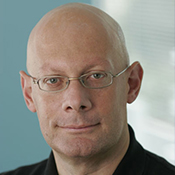
Usama Fayyad is Chairman & Founder, Open Insights and Executive Director of the Institute for Experiential AI @ Northeastern University. He was previously co-founder and chief technology officer (CTO) at OODA Health and served as global chief data officer and group managing director at Barclays in London, after he launched the largest tech startup accelerator in MENA as Executive Chairman of Oasis500 in Jordan.
His background includes chairman and CEO roles at several startups, including Blue Kangaroo Corp, DMX Group, and digiMine Inc (Audience Science). Usama was the first person to hold the chief data officer title when Yahoo! acquired his second startup in 2004. At Yahoo! he built the Strategic Data Solutions group and founded Yahoo! Research Labs, where early work on big data led to open source and the launch of Hadoop. He has held leadership roles at Microsoft and founded the Machine Learning Systems group at NASA’s Jet Propulsion Laboratory, where his work on machine learning resulted in the top Excellence in Research award from Caltech, and a US Government medal from NASA.
Usama has published over 100 technical articles on data mining, data science, AI/ML, and databases. He holds over 30 patents and is a fellow of both the Association for the Advancement of Artificial Intelligence (AAAI) and the Association for Computer Machinery (ACM).
Krisztián Flautner (BSE CE ’96, MSE CSE ’98, PhD CSE ’01)

Krisztián Flautner was most recently the CEO of Banzai Cloud, a startup whose “hybrid any-cloud platform” radically simplifies how enterprises can deploy and manage their private clouds based on Cloud Native technologies. Previously, Flautner was general manager of the Internet of Things Business and VP of Research and Development at ARM, where he was focused on new business opportunities and the proliferation of ARM technologies. He received a PhD in computer science and engineering, along with a number of other degrees, from the University of Michigan.
Krisztián has authored or co-authored over 80 publications and received various best paper awards including the 2017 ISCA influential paper award for groundbreaking research in power-efficient computing. He was the recipient of the 2012 U-M Alumni Merit Award in Computer Science and Engineering.
Amber Huffman (BSE CE, ’98)
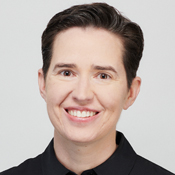
Amber Huffman is a Principal Engineer at Google Cloud, where she is responsible for leading industry engagement efforts in the data center ecosystem across servers, storage, networking, accelerators, power, cooling, security, and more. Prior to joining Google, she spent 25 years at Intel serving as an Intel Fellow and VP. Amber is the President of NVM Express, on the Board of Directors for the Universal Chiplet Express Interconnect, and the co-chair of the Open Compute Foundation Storage Project. She has led numerous industry standards to successful adoption, including NVM Express, Open NAND Flash Interface, and Serial ATA.
Amber earned a bachelor’s degree in computer engineering from the University of Michigan and a master’s degree in electrical engineering from Stanford University. She has been granted more than 20 patents in storage architecture. Amber is known as an inclusive leader and passionate mentor for technologists, including a track record of sponsoring numerous men and women to senior technologist positions.
David Leinweber (BA Economics & History ’09 – Vanderbilt, MBA ’14)
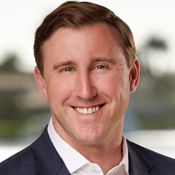
David Leinweber is the CEO of Ascent Cloud, a Detroit-based SaaS company that provides Sales Performance Management solutions to help companies plan, execute, and grow via territory planning, geolocation, gamification, and coaching. David is also the co-founder of The Ascent Group, a technology investment firm based in Detroit.
Prior to Ascent Cloud and The Ascent Group, David was the Director of Marketing at New World Systems, a provider of public safety and local government software which had a successful exit to a Fortune 500 software company. Prior to New World, he worked for Accenture as an IT Consultant within their Federal Services division in Washington, D.C. In that role, David worked with the U.S. Department of Education to design and build enterprise web applications to provide $134B in student aid to over 20M borrowers.
In 2009, David received the Dr. Henry B. Tyler Academic Achievement award as a graduating senior from the Vanderbilt football team. David is an advocate for the revitalization of Detroit, and he is proud of his prior work with Back On My Feet which organizes running groups for people living in homeless shelters.
Shaalu Mehra (BS Physics ’92 – Notre Dame, MSE CSE ’96, J.D. ’98 – Columbia University)
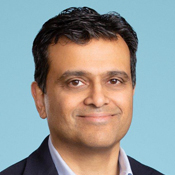
Shaalu Mehra is a partner in the law firm of McDermott Will & Emery. Shaalu advises clients on corporate and technology transactions, with an emphasis on emerging company venture capital, corporate venture capital, multinational joint ventures, technology procurement, and IP acquisition / licensing. His clients range from Fortune 50 multinationals making “bet-the-company” technology investments — including FAANG companies, automakers, energy producers, telcos, and chipmakers — to first-time founders new to the EC/VC ecosystem.
Shaalu has practiced in Silicon Valley since graduating law school in the late 90s and has a background as a computer science researcher and software developer. He speaks frequently at international conferences regarding technology law, and has also been a featured speaker at numerous national and international conferences such as the Open Source Business Conference, LinuxWorld and the SEC Hot Topics Conference, as well as events sponsored by a number of high-profile organizations, including the Association of Corporate Counsel, ITechLaw, Sourcing Industry Group, Stanford University, Boalt Hall, The University of Washington, TiE and NASABA.
Kunle Olukotun (BSE EE ’85; MSE PhD CSE ’87 ’91)
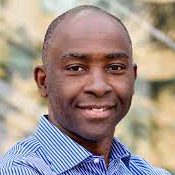
Kunle Olukotun is the Cadence Design Professor at the Stanford School of Engineering and Chief Technologist and Co-founder, SambaNova Systems. Kunle is known as the “father of the multi-core processor”, and the leader of the Stanford Hydra Chip Multiprocessor research project. Kunle’s achievements include designing the first general-purpose multi-core CPU, innovating single-chip multiprocessor and multi-threaded processor design, and pioneering multicore CPUs and GPUs, transactional memory technology and domain-specific languages programming models. In 2020, he co-founded SambaNova, the first generative AI platform specifically optimized for enterprises and government organizations.
Hilary Packer (BS CS, ’91)
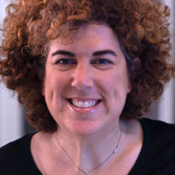
Hilary Packer is Executive Vice President and Chief Technology Officer at American Express Company. Packer has over two decades of experience in the financial services industry. Prior to joining American Express, she worked at E*TRADE as Senior Vice President and Head of Application Development. Before that, she served as a Managing Director of JPMorgan Chase & Co. and Goldman Sachs. Earlier in her career, Hilary held roles at Deutsche Bank, NatWest Markets, and Morgan Stanley. Hilary has been featured in blogs, such as The Glass Hammer, and is an advocate for women in technology. Hilary earned her BS in Computer Science at University of Michigan and her Masters of Software Engineering at Carnegie Mellon University.
John W. Sanguinetti (BS Applied Math ’70, MS CCS ’71, PhD CCS ’77)
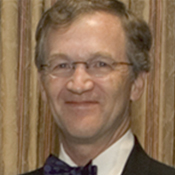
John Sanguinetti has been active in computer architecture, performance analysis, design verification, and electronic design automation for 35 years. After working as a design verification engineer at Ardent Computer and NeXT Computer, he founded Chronologic Simulation in 1991 and was the principal architect of VCS, the Verilog Compiled Simulator. VCS is still the market-leading logic simulator. Subsequently, he was a founder of Forte Design Systems, where he served as Chief Technical Officer until its acquisition by Cadence Design Systems. John founded Adapt-IP where he currently serves as Chairman of the Board. He was honored as a fellow of the ACM in 2012, has 15 publications, including the Verilog Online Training course, and one patent.
Robert D. Scott (BSE CE, ’75)
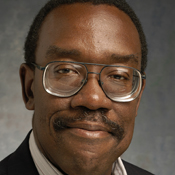
Robert Scott is Vice President and Dean for the Global Institute for Professional Development of the IT Senior Management Forum (ITSMF), a national organization dedicated exclusively to fostering upper-level executive talent among African-American IT professionals. In this capacity, he oversees academies and online platforms dedicated to the development and career progression of Black/African-American technology executives with a focus on information technology career fields. Robert has been a member of ITSMF for 20+years, serving as the National Program Chair for four years. He recently retired from the University of Michigan where he was a director within the Center for Engineering Diversity & Outreach. As Special Counsel, Robert supported the diversity and outreach strategy and programs across the Engineering College.
Robert is a former business executive, retired from the Procter & Gamble Company after over 32 years of service. His background includes demonstrated leadership in strategic planning and analysis, IT management, product distribution, and global learning systems. Robert also serves as a Cutter Fellow, with consulting responsibilities to CIOs and other senior IT executives.
Richard Sheridan (BS CCS ’80, MS CICE ’82)
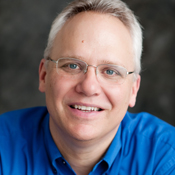
Rich Sheridan is the Chief Executive Officer, Co-founder, and Chief Storyteller at Menlo Innovations. His career went from programmer in 1982 to VP of R&D in 1997 at Interface Systems in Ann Arbor. in 2001, Rich pursued his long sought entrepreneurial dreams and co-founded Menlo Innovations with an explicit mission to “end human suffering in the world as it relates to technology.”® by returning joy to technology. The Ann Arbor team at Menlo Innovations designs and develops customer software on behalf of their business clients. Menlo is so well known for its culture that over 3,000 people per year visit from around the world just to see it. Rich has captured the essence of the Menlo culture in two books: Joy, Inc. – How We Built a Workplace People Love (2013), and Chief Joy Officer – How Great Leaders Elevate Human eNergy and Eliminate Fear (2018).
Dug Song (BS CS ’97)
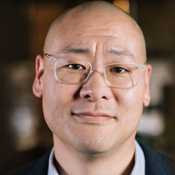
Dug Song is co-founder of the Song Foundation, and former co-founder & CEO of Duo Security, Michigan’s first tech unicorn and largest venture-backed acquisition, which sold to Cisco in 2008 for $2.35 billion. As a founder and funder, Dug is a champion for growing community wealth – economic, social, cultural, and environmental – to build a more just and inclusive future for all.
Dug is heavily involved in the global startup community and fostering entrepreneurship in Michigan, as an active investor, advisor, and board member. He is co-founder of the Michigan Founders Fund, helping entrepreneurs turn business success into positive community impact, and serves on the boards of the Detroit Regional Chamber, and the US Department of Commerce’s National Advisory Council for Innovation & Entrepreneurship, with a focus on racial justice and economic equity.
In 2020, Dug and his wife started the Song Foundation to invest in the innovative people and organizations improving the quality of life for all in Southeast Michigan. Song also serves on the executive board of Wallace House, home of the Knight-Wallace Fellowships for journalists, and on the advisory board of Venture for America in Detroit.
Erin Teague (BSE CE ’04, MBA – Harvard ’08)
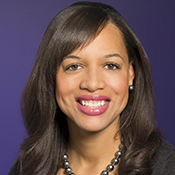
Erin Teague is Sr. Director of Product Management & Tech Advisor to SVP of Search, Ads, Geo, Commerce, Bard, and Assistant at Google. Erin has deep experience building best-in-class consumer web and mobile Internet products that reach and delight billions of active users. She is currently the Director of Product Management at YouTube. In this role, she is the global lead for several product verticals including Sports, Movies, and Shows along with the Racial Justice, Equity and Product Inclusion product team. Prior to this role, Erin led YouTube’s Virtual and Augmented Reality product teams where she was responsible for immersive video and created the YouTube VR app which is rated #1 across VR platforms.
Before joining YouTube, Erin was the Director of Product Management for Yahoo’s Fantasy Sports and a Product Manager at Twitter. She began her career as a software engineer at Morgan Stanley, where she designed algorithms embedded in electronic trading applications in the firm’s Algorithmic Trading Technology group.
Erin is the recipient of the 2019 B.E.T. Her Tech Maven Award and has been recognized as Glamour Magazine’s “35 Women Under 35 Who Are Changing the Tech Industry,” Business Insider’s “Silicon Valley Top 100,” one of the “100 Most Influential Women in Silicon Valley” by Silicon Valley Business Journal, “The Next Generation of Tech Stars” by Refinery29, and “40 Under 40 in Silicon Valley.” She is a Board Member at ID.me, which simplifies how individuals securely prove and share their identity online.
Rich Uhlig (BSE CE ’88, PhD CSE ’95) – CSE Advisory Board Chair
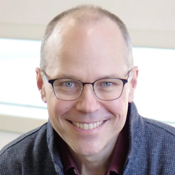
Rich Uhlig is an Intel Senior Fellow, Corporate VP, and Director of Intel Labs, the organization responsible for research and delivery of break-through innovations to reshape Intel’s future in areas spanning computing, communications, security and intelligent systems. Rich is also the Executive Sponsor for the Intel Science and Technology Centers (ISTCs) for Visual Cloud Systems (centered at CMU/Stanford) and for Software Principles for Advanced Networking (SPAN), centered at the University of California, Berkeley.
Rich started virtualization efforts within Intel in 1998 and led the definition of multiple generations of virtualization architecture for Intel processors and platforms, known collectively as “Intel Virtualization Technology” (Intel® VT). The first generation of VT features were shipped in Intel platforms in 2005. Over the subsequent decade, Rich has led a progression of new platform features that extend VT to support an increasing range of new uses and applications for virtualization. Intel VT is now widely used across the industry to improve total cost of ownership (TCO) in cloud data centers, to improve the security of PC systems, and more recently as the foundation for transitioning the legacy communication infrastructure onto general-purpose computing platforms with network-function virtualization (NFV).
Prior to joining Intel in 1996, Rich held post-doctoral fellowships at the European national research labs of Germany, Greece, and France, where he worked on advancing simulation technology and on architectural support for microkernel operating-system design.
Stevan Vlaovic (PhD CSE ’02)
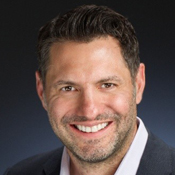
Stevan Vlaovic is Senior Vice President of Product and Engineering for Oracle Data Cloud. Stevan’s résumé encompasses a mix of Fortune 500 companies—such as Netflix and Yahoo!—and start-ups, including his own.
He received a doctorate in computer science and engineering from the University of Michigan and earned degrees in computer engineering and electrical engineering. He previously held management positions at Affirm, SmartThings, and Netflix.
Elaine Wah (PhD CSE ’16)
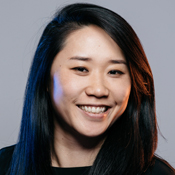
Elaine Wah is a Vice President and data scientist at BlackRock AI Labs, which is a multi-disciplinary team that leverages machine learning and statistical modeling to solve strategic problems across the firm. Prior to BlackRock, she was Head of Policy Research at IEX, which was featured in the book Flash Boys by Michael Lewis. At IEX, Elaine conducted quantitative research on market structure, trading dynamics, and customer performance to inform policy initiatives for IEX’s US equities exchange.
Elaine has also conducted research at the US Securities and Exchange Commission and Microsoft Research New York City. She holds a PhD in Computer Science and Engineering from the University of Michigan, where she used agent-based modeling to study the impact of different types of algorithmic trading strategies on investors. She also holds a BS in Electrical Engineering from the University of Illinois at Urbana-Champaign and an MS in Computer Science from UCLA. Her research on market structure has been cited by Bloomberg, Reuters, CNN Money, and the Wall Street Journal.
Peter Wurman (MSE ME ’88, MS CSE ’96, PhD CSE ’99)
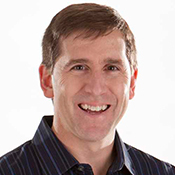
Peter Wurman is the Director of Sony AI America. He was previously the CTO and co-founder of Kiva Systems, which pioneered the use of mobile robotics in warehouses and distribution facilities. Kiva was acquired by Amazon, which has deployed more than 45,000 robots to Amazon warehouses. Peter designed the software systems that ran Kiva-based warehouses and is co-author on over 60 patents and 50 technical papers. In 2020, he was inducted into the National Inventors Hall of Fame for his accomplishments at Kiva.
Prior to Kiva, Peter was an Associate Professor of Computer Science at North Carolina State University in Raleigh, North Carolina. Peter’s teaching focus was e-commerce systems and his research focused on electronic auctions (especially combinatorial auctions), multi-agent systems, and resource allocation. Peter earned his Ph.D. in Computer Science from the University of Michigan in 1999, and his B.S. in Mechanical Engineering from MIT in 1987.
 MENU
MENU 
